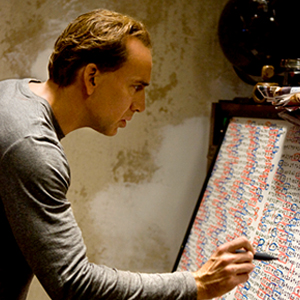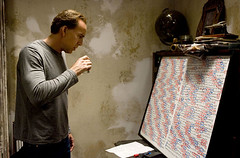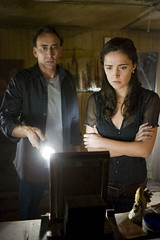Review of KNOWING part 1: DETERMINISM
“Just step back. Have another look at it! Systems that find meaning in numbers are a dime in dozen. Why? Because people see what they want to see.”
(For the introduction to our series on KNOWING, click here)
 Astrophysicist and MIT Professor John Koestler is a man biased by a very personal loss. While not as hard-drinking (or suicidal) as his character in Leaving Las Vegas, actor Nicolas Cage brings a cold, somber silence to our protagonist in KNOWING, rarely chewing scenery or waving his arms as is common in Cage flicks. Director Alex Proyas keeps the actor constrained to a character that depicts a man who has lost hope in anything save the investment in his son, and even that seems lacking because he is ill-equipped. The film opens as he challenges the students in his class with contrasting theories of randomness and determinism.
Astrophysicist and MIT Professor John Koestler is a man biased by a very personal loss. While not as hard-drinking (or suicidal) as his character in Leaving Las Vegas, actor Nicolas Cage brings a cold, somber silence to our protagonist in KNOWING, rarely chewing scenery or waving his arms as is common in Cage flicks. Director Alex Proyas keeps the actor constrained to a character that depicts a man who has lost hope in anything save the investment in his son, and even that seems lacking because he is ill-equipped. The film opens as he challenges the students in his class with contrasting theories of randomness and determinism.
“The theory of randomness says it’s all simply coincidence. There is no grand meaning.” – John Koestler
Determinism has as much to do with causality as it does with the notion of design, so the notion that everything follows the order of a causality chain – and hence, with the right knowledge, could be predicted – doesn’t point immediately to God. The argument for a first cause, or an uncaused cause, is where these debates emerge. Still, the deep tragic hole in Koestler’s life has led him to abandon any sense of determinism, or destiny, or fate, or higher order. He cannot see or accept any meaning in the loss of his wife, the mother of his young son.
“…if there’s an order… in all of this disorder…” – Bono, lead singer of U2
Koestler’s bias is evident in the ongoing silent standoff with his father, who is, conveniently, a Christian pastor. It’s evident to the discerning viewer that Koestler isn’t truly wrestling with causality OR determinism, but underlying implications: the idea that a conscious mind, an entity (a god?) is behind the scenes and hence involved in the decision that robbed him of his spouse. In this way, KNOWING is a cinema sibling with SIGNS, the controversial M. Night Shyamalan film. Koestler isn’t angry at his father, or at the universe, but about who or what might be orchestrating the causal choir. He doesn’t want to acknowledge an intelligent design.
 “People break down into two groups. When they experience something lucky, group number one sees it as more than luck, more than coincidence. They see it as a sign, evidence, that there is someone up there, watching out for them. Group number two sees it as just pure luck. Just a happy turn of chance.” – Mel Gibson as Graham Hess, in Signs (2002)
“People break down into two groups. When they experience something lucky, group number one sees it as more than luck, more than coincidence. They see it as a sign, evidence, that there is someone up there, watching out for them. Group number two sees it as just pure luck. Just a happy turn of chance.” – Mel Gibson as Graham Hess, in Signs (2002)
Even the numerical premise that initially disturbs Koestler has an intelligent design subtext; the page of numbers he finds predicts “every major global disaster from the last 50 years in perfect sequence…” and soon the troubled teacher realizes it also “predicts that tomorrow…” grave events will occur. Where the numerical revelation CAME from, however, is not the schoolgirl who scribbled it. Something, someone, fed the girl this information, and the shadowy characters in the dark outside Koestler’s home add fuel to his fears that somehow this cracks open the cosmological argument for the existence of an intelligent causal agent… if not God, someone who at least is intelligent enough to know the alpha and omega, beginning and end, of the human race.
![]() “The future’s not set. There’s no fate but what we make for ourselves!”
“The future’s not set. There’s no fate but what we make for ourselves!”
– whiny Ed Furlong, as whiny John Connor, in Terminator 2
Is there a beginning and end to the story of man? Are we fated? Do we have a destiny? Some of us LOVE the notion of destiny when it involves romance, or a deeper purpose for our suffering, but when we realize the full set of consequences – the impact on our will, on our decisions and direction – most of us chafe at being predestined.
 “The future has not been written. There is no fate but what we make for ourselves. I WISH I COULD BELIEVE THAT…” – morose Nick Stahl, as morose John Connor, in Terminator 3
“The future has not been written. There is no fate but what we make for ourselves. I WISH I COULD BELIEVE THAT…” – morose Nick Stahl, as morose John Connor, in Terminator 3
(Pop Quiz: which John Connor is correct? Considering angry Christian Bale, as angry John Connor, is crushing robot skulls in the upcoming Terminator: Salvation Nick’s doubt in fate, time-stream alterations and human free agency seems spot-on. Maybe the REAL reason people didn’t like the third film is because it contained a will-crippling kernel of truth.)

News flash people, you can’t have it both ways; if you and your significant other were “destined” to be together, you’re not an autonomous agent with free will. Congratulations, you’re FREE… and romance is dead. For various reasons, related to fear, regret, independence (but ultimately control) we don’t want to be contingent begins. We don’t want to think we’re influenced and inclined, dependent, and certainly not fated. Under the guidance of an ordered hand sounds comforting, but we don’t like the idea of that hand pulling strings. However tight or loose we hold it, however, and whatever we call it – wheels of fate, karma, cosmic justice, sovereignty… something in us is drawn to the idea.
Even within Christianity (the faith of Koestler’s father that our protagonist in KNOWING has forsaken) there is a healthy tension and heated debate between predestination and “free will”, though it’s impossible to argue against scripture that make it clear the biblical Creator is a God defined as one who predestines and appoints. A first century Christian hymn quoted in the book of Acts reads “for truly in this city there were gathered together against your holy servant Jesus, whom you anointed, both Herod and Pontius Pilate, along with the Gentiles and the peoples of Israel, to do whatever your hand and your plan had predestined to take place.”
The oldest chronicle in the Bible – about Job, a man who suffers great loss like our character in Proyas’ film – admits that God’s “eyes are on the ways of a man, and he sees all his steps.” Later, the powerful, rich and wise philosopher-King Solomon took this one step further, asserting that “The heart of man plans his way, but the Lord establishes his steps”. Unveiling even more, Jesus’ disciple Peter wrote “we are his workmanship, created in Christ Jesus for good works, which God prepared beforehand, that we should walk in them.”
 The big question: Has the future been written? In Knowing, Koestler is despondent and drinking, wanting things to be meaningless, to abandon any hope or hate about “order” or “God”… to be numb… but the mysterious numbers and rippling implications create a chain of reason that he cannot deny. Director Proyas staged a scene that runs uncut for over two minutes as Cage’s character wanders through a horrific accident, punctuating the causal chain and impending sense of apocalypse, which we will speak to in Part 2.
The big question: Has the future been written? In Knowing, Koestler is despondent and drinking, wanting things to be meaningless, to abandon any hope or hate about “order” or “God”… to be numb… but the mysterious numbers and rippling implications create a chain of reason that he cannot deny. Director Proyas staged a scene that runs uncut for over two minutes as Cage’s character wanders through a horrific accident, punctuating the causal chain and impending sense of apocalypse, which we will speak to in Part 2.




Those who need an absolute creator or a wrathful ruler are most likely to follow a false one or be a dictator themselves. Therfore deism is a totalitarian view of the universe. The very idea that there is a supreme being who is aloof to human suffering and answers to no one is moral fascism. Most religion is rooted in fascism because zealots have no tolerance for those who reject their beliefs.
Very interesting, Noah. What about a creator who answers to no one but is NOT aloof to human suffering? I don’t really disagree with you about most religion, and intolerance. I’m just not sure it’s about “needing” a creator… so much as humbly recognizing there is one. I don’t have intolerance for those who reject what I believe, but I do believe there are consequences for creatures who reject their Creator.